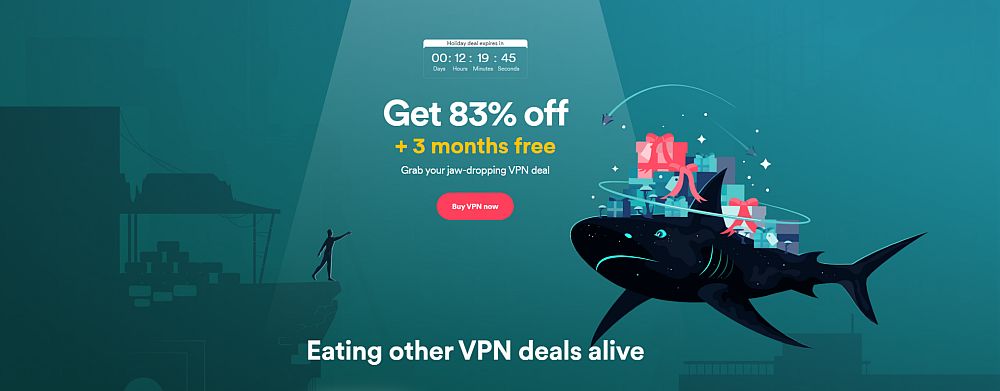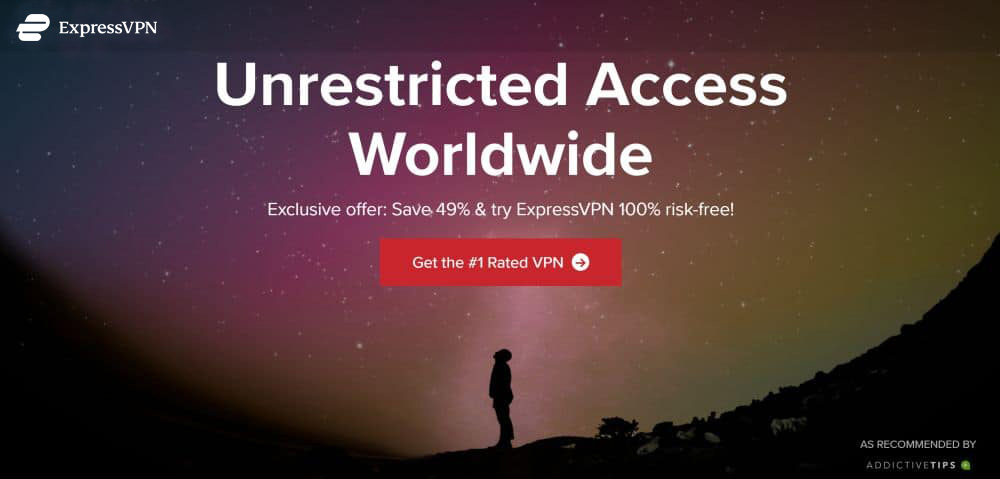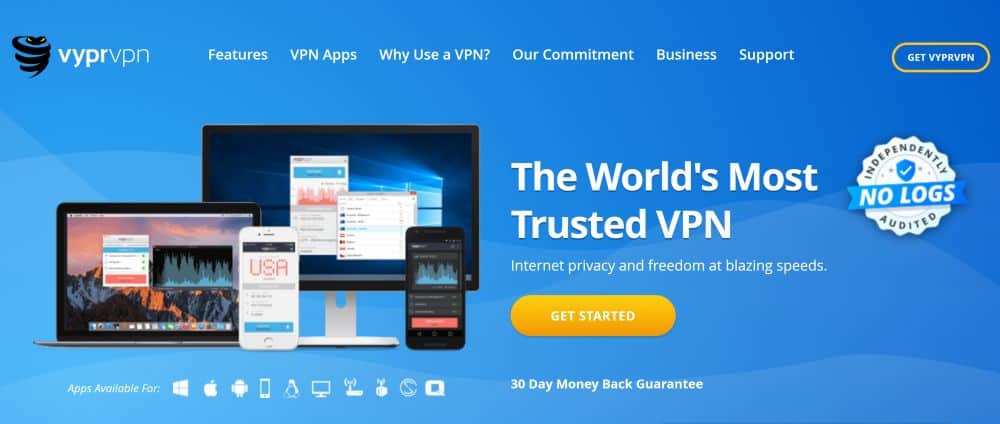Best VPN for iPad: Our Top 5 Favorites
Virtual private networks (VPNs) are widely used these days, but which is the best VPN for iPad users? VPNs provide anonymity and privacy for browsing activities, but they also unlock otherwise restricted streaming content, giving users a much broader catalog of movies and TV shows to watch.
This guide will cover exactly what must-have VPN features to look for, which services are especially compatible with iPads, and the most noteworthy pros and cons of each service.
For those in a hurry, here is a quick rundown of the VPN finalists for iPads:
- NordVPN: This very popular VPN service offers fast speeds, a large server network, and a wide range of additional features.
- Surfshark: Known for good prices, strong security measures, and no limits on how many connections you can have at once.
- ExpressVPN: Offers strong basics like fast speeds and encryption, but they also include extra features, such as their Lightway protocol, which improves speed and security, along with password managers and ad blockers.
- VyprVPN: Well known for their Chameleon protocol that helps users get around strict networks, like those in China and Russia. They own all their servers, which is uncommon. This means no third parties can access your data.
- StrongVPN: A reliable, easy-to-use VPN provider with a good selection of servers and support for up to 12 connections at once. They also own their own servers.
What is a VPN?
Before getting into choosing the best VPN app for iPad users, it’s helpful to understand what a VPN really does. Virtual private networks greatly improve online privacy and anonymity. They encrypt your internet traffic and also obscure your IP address, so your location and browsing activities are hidden.
The VPN service provider has thousands of remotely based servers. When you choose a server from one of these remote countries, it appears as if you are located in that region. This not only further protects your privacy, it can also let you access geo-restricted content, such as streaming media that is only available in certain locations.
Our Contenders for Best VPN for iPad
The best VPN services have apps that are compatible with all kinds of devices, including gaming consoles and smartphones. This guide will consider what is the best VPN app for iPad, specifically. That said, most VPNs allow a certain amount of simultaneous connections from multiple devices. So while you are connecting with your iPad, someone else in your household could also connect with a different device, such as a Windows PC or Amazon Fire TV stick.
1. NordVPN

NordVPN has a massive reputation as a VPN favorite, and that rep is still going strong. Plans range from basic to complex, with multiple heavy hitting features that increase with each payment tier.
Basic plans still have threat protection through NordVPN’s DNS servers, which block malicious domains and ads. Basic also includes encrypted, high-speed connections and ten simultaneous connections per account.
More advanced tiers include extras like dark web and credit monitoring, identity theft insurance, password managers, and next-level threat protections. They are also widely compatible with most devices, including iPads.
Read our full NordVPN review.
- Unblocks American Netflix
- Extensive server park of over 5,400 different servers
- Tor over VPN, double VPN
- Extra-secure Double VPN for data encryption
- Money back guarantee policy (30-days).
- Very little
- Can't specify City or Province in App.
2. Surfshark

Like NordVPN, Surfshark gives you more features when you choose higher-tier plans. That said, their basic plan does give you more bang for your buck than NordVPN does. Examples of basic features include the Bypasser tool (which allows specific apps/sites to bypass the VPN), a rotating IP address, a cookie pop-up blocker, and other helpful functions. Advanced plans include credit monitoring, data removal from company databases, and other privacy protections. Add to all of this that Surfshark is zippy and responsive, and you are a contender for the best VPN app for iPad users.
- Break through harsh censorship to securely access social media and foreign news sites
- One of the first VPNs to implement RAM-only servers
- No questions asked money back guarantee
- Favorable BVI jurisdiction guarantees no logs kept
- Helpful 24/7 live chat with an actual human being.
- Overall, not much to complain about
- Power users may wish for more settings to fiddle with.
Read our full Surfshark review.
3. ExpressVPN

There’s a lot to love about ExpressVPN. Besides everything already listed, they also use their TrustedServer feature. This means they don’t save any data on any hard drives, they use RAM only.
Every time they reboot their system, all of the data is wiped, which keeps your information that much more protected. They also don’t keep connection or activity logs, frequently undergoing third-party audits to verify their privacy policies.
Similar to the other VPNs we’ve listed, they also have advanced features, such as password managers, ID theft insurance, data removal, credit scanners, etc. ExpressVPN makes it easy to protect not only your browsing habits but also your online identity.
Read our full ExpressVPN review.
- SPECIAL OFFER: 3 months free (49% off - link below)
- Superfast servers (minimal speed loss)
- No DNS/IP leaks found
- Strict no-logging policy
- Great support (24/7 chat).
- Slightly more expensive than some other options.
4. VyprVPN

VyprVPN is a little different from many of the others on this list. Yes, they have far fewer servers (a mere 700 compared to NordVPN’s thousands), and yes they are also a little bit slower.
However, they own their entire fleet of servers. What does that mean? No third parties ever have access to your data. It is only accessible through VyprVPN, making your data considerably harder for anyone else to access. They are one of the few VPNs with this feature.
Additionally, their Chameleon protocol can help users access content even in the most strict censorship regions, making it a favorite for the best VPN for China, India, and the Middle East. This protocol is standard for all of their plans.
Read our full VyprVPN review.
StrongVPN
If you want a basic, reliable, and easy to use VPN that is compatible with iOS, StrongVPN is a good option. They have robust privacy and security practices to protect your data and anonymity, and their interface is one of the easiest to navigate on the market. It’s been well-tested for streaming media, and while it’s not quite as fast as some VPNs, it does a good job with most tasks. StrongVPN excels in two areas. First, it’s incredibly beginner friendly.
No, it doesn’t have all of the bells and whistles as some VPNs, but not every user is looking for complex plans. Second, like VyprVPN, they own their own servers, greatly increasing your privacy and protecting you from third-parties accessing your information. While VyprVPN has a broader range of server locations, StrongVPN has more actual servers. Either way, both providers have strong privacy benefits from running and owning everything themselves.
Pros:
- Uses WireGuard protocol for increased speed, performance, and security
- 950 servers
- Beginner friendly and intuitive interface
- Up to 12 simultaneous connections
- Excellent customer support
Cons:
- Servers are only located in 30 countries
How We Tested the Best VPN for iPads
There are a variety of factors to consider when deciding what the best VPN app for iPads is. These factors included:
- A wide range of compatible devices (particularly iOS devices like iPads)
- No-logs policies to protect your data
- Providers with reputations for quality, dependability, and wide availability
- Speeds. They had to meet criteria for being able to stream media and other activities with minimal buffering
- Robust privacy practices and encryption protocols
- Ample servers and locations give users plenty of options
Why Use a VPN on Your iPad?
Using a VPN has multiple benefits. Here is a quick overview of why VPNs are important and how to make the most out of them:
- To keep your data from being sold to third-parties: It’s quite common for ISPs to sell your browsing data and habits to data brokers and other third-parties. They then can use this for marketing and consumer targeting purposes. Examples of the data ISPs can collect include the websites you visit, how long you are on the sites, and even your location. Not every country has to worry about this due to privacy laws in places like Europe. However, citizens based in the United States are particularly vulnerable as this practice is legal there.
- To help protect your home network: Cyber criminals can take advantage of poorly protected home networks. Every device on your network (including your iPad) can be at risk if you don’t have the proper protections in place. A good VPN can secure the devices you have connected to your Wi-Fi, making you less of a target.
- To prevent unfair price hikes: You may be surprised to learn that the prices of online products and services can vary depending on your location and browsing habits. This dynamic pricing can make things like airline tickets and hotels more expensive simply based on the demands of your area or how many times you visit their website. Using a VPN can help you shop for the best deals, preventing these companies from using your location against you.
- Stay safe on public Wi-Fi: If you’re in public with your iPad or other device, such as at a coffee shop, you have zero control over the security practices of that public Wi-Fi provider. However, by using a VPN, you can be sure that your data is encrypted and that you have better protections in place.
- To circumvent geo-restrictions: These restrictions can be something as simple as watching Netflix content that is only normally available in Canada or as severe as breaking through strict government censorship, like the Great Firewall of China. If you’re using a VPN for the latter reason, be aware that some countries have laws against using a VPN at all. While you can often obscure your usage, if you are detected, there may be legal consequences. Keep these factors in mind when deciding if a VPN is a good fit for you.
How to Choose the Right VPN for Your Needs
So, which provider has the best VPN for iPad users? That depends. There are some important qualities to consider before plunking down your money for a subscription. Here are some factors to keep in mind.
User Interface/Beginner Friendly
With so many add-ons, extra features, and advanced plans available, things can get overwhelming for beginners immediately. Fortunately, the major VPN providers (like the ones on our list) try to keep things intuitive for their users. Many offer 24/7 customer support, too. However, if you want something particularly simple, do some research and see which providers fit best with your abilities. Also, many VPNs have tutorials or instructions to take advantage of as well, such as blogs and support center resources.
Cost
This is one of the more straightforward factors for users to keep in mind. What is your budget? What features do you absolutely have to have, and how expensive are they? If you just want a simple VPN service that doesn’t do anything advanced, choose a lower priced tier. You can usually upgrade if needed, but it’s better to start simple and build up as required.
Also, it is typical for many VPN providers to have competitively low introductory prices, especially if buying on an annual basis instead of a monthly basis. The problem there is that some users don’t pay attention to the renewal costs and, a year later, are unpleasantly surprised by their new bill. Do a little digging and see what you’re getting into. Additionally, you may want to find out how much advance notice you need to give if you plan to drop your VPN service before it renews. Some of them require a lot of notice, and if you miss your cancellation window, you could be out some money.
Privacy Features and Security Practices
The VPNs on the above list were all selected with privacy and security factors in mind. When selecting your provider, make sure they have:
- A no-logs policy and no data tracking
- Strong encryption protocols
- Kill switch feature (this blocks your internet if your VPN unexpectedly drops, protecting your data from your ISP. This is standard in many VPNs)
- DNS leak protection
Fast Speeds
Because VPNs require encryption and other data obfuscation, they tend to be slower. Top providers have ways of minimizing this, to the point that you’ll barely notice lags, if you even do. The more servers to choose from, the better speeds tend to be. For instance, if you don’t have servers near your region, the data packet has to travel a lot further, which slows down speeds. Also, if a server is overloaded with too many users connecting to the same server, it will likewise be slow. More servers means more choices and less overload. You can always jump to a different server if one is overloaded or sluggish, letting you get back to a faster browsing experience with little effort.
Frequently Asked Questions
- Should I use a free VPN?
Most free VPNs are suspect, at best. Many sell your data to third-parties, which is ironic considering you’re trying to enhance your privacy. Others may be installing malicious software to your device without your knowledge. There are a few somewhat reputable free VPNs that seem to be lower risk. However, they usually have massive limitations, overloaded servers, few extra features, and are usually just a stripped down version of their pay-to-use VPN that isn’t particularly useful.
- Does Apple have a VPN service?
No, Apple does not have a built-in VPN service for their devices. Apple devices are compatible with most VPN providers, however, and many VPNs can be configured directly on them without the need for an app.
- Are VPNs legal?
In most countries, such as Europe, the U.S., and Latin American regions, yes. VPNs are absolutely legal. Heavily censored countries, however, like China and Russia, have restrictions on VPN usage, and others make it illegal to use entirely. Be sure to know the laws of where you live. Sometimes, penalties can be severe for VPN usage, and it may not be worth the risk.
- What is geo-blocking?
Geo-blocking is when content is banned based on location. VPN-restricted or banned countries are known to block content from regions they deem a threat or want to keep their citizens from accessing.
Frequently, geo-blocking is used to describe streaming content that users want to access outside of their region. Licensing agreements, such as for specific films or television shows, usually have restrictions as to the region the copyright is valid for. Netflix may buy the copyrights to a show, but that doesn’t mean they bought the copyright for every single region.
If you live in an area outside of that show’s licensing agreement, it’s simply not available to you. VPNs can make it appear that you’re based in a different location, which means you suddenly have access to films and shows specific to that area. You just need to use a VPN to sign into your streaming provider, and you’ll gain an expanded library of material to watch. Just be sure to pick the best VPN for Netflix, as they aren’t all equally equipped for accessing this specific streaming service.
If you need a VPN for a short while when traveling for example, you can get our top ranked VPN free of charge. NordVPN includes a 30-day money-back guarantee. You will need to pay for the subscription, that’s a fact, but it allows full access for 30 days and then you cancel for a full refund. Their no-questions-asked cancellation policy lives up to its name.



